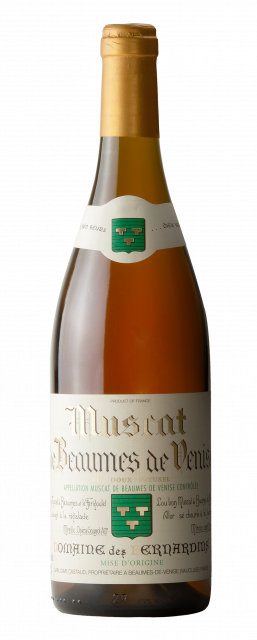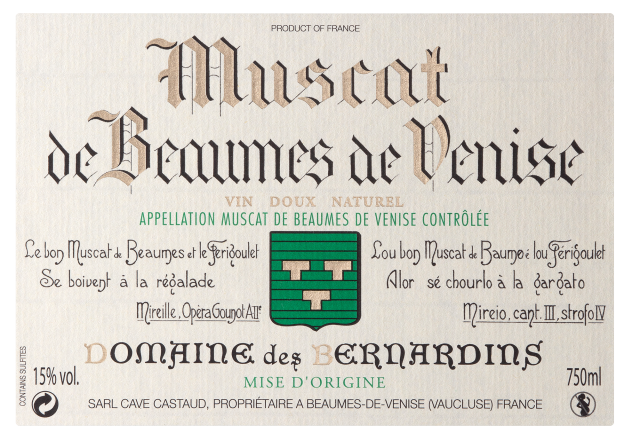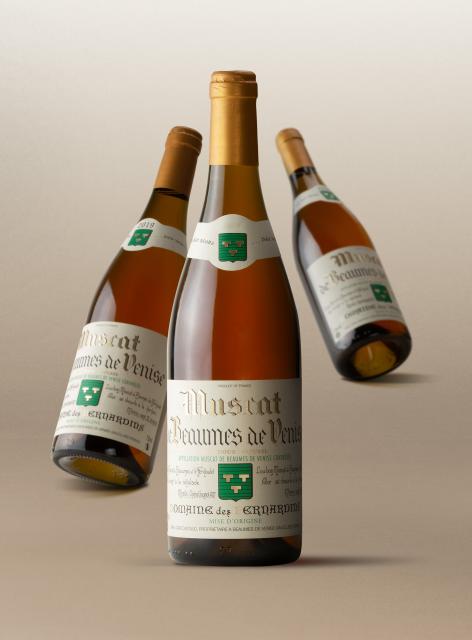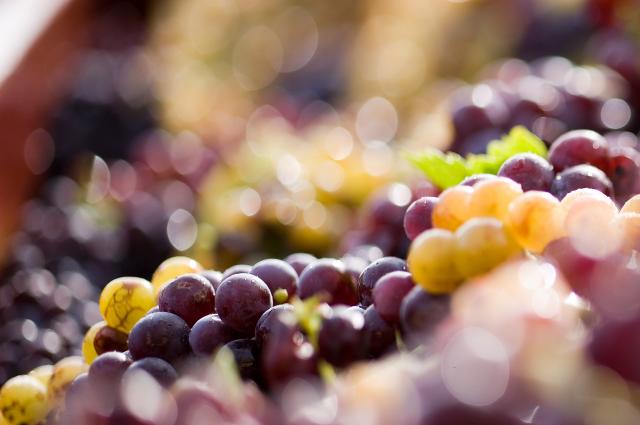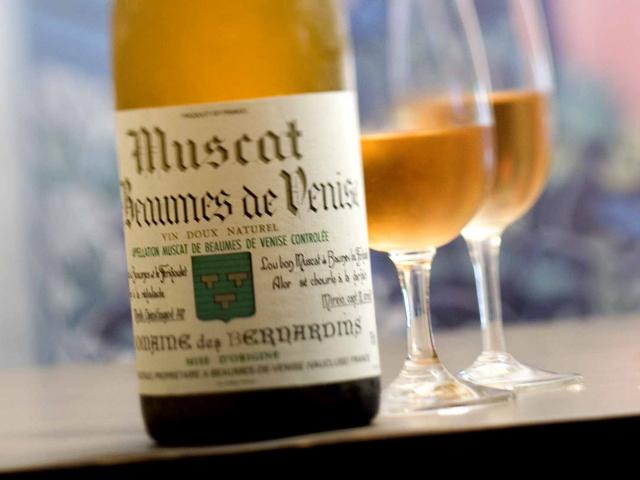Muscat de Beaumes-de-Venise is a sweet wine with a lovely freshness and captivating aromas of rose and apricot.
Presentation
The vintage
A year of extremes with abrupt climate variations, as we have seen frequently recently.
A very dry winter with only 2 weeks of cold at the end of January, the vines began to bud around March 10. The dry weather persisted until May 12, date when a sudden change in climate with first rain of a long series, who continued until the end of June. This moisture during the most sensitive period for the vines put our teams in the vineyards to the test, requiring a lot of work and attention!
This spring water has been beneficial for the growth and ripening of the grapes during a hot summer, particularly in August and September. The harvest were important after 2 years of small yields. Harvesting began on August 31 for the whites and mid-September for the reds. The harvest tooks place in ideal conditions and promises wines of beautiful maturity and great potential!
A very dry winter with only 2 weeks of cold at the end of January, the vines began to bud around March 10. The dry weather persisted until May 12, date when a sudden change in climate with first rain of a long series, who continued until the end of June. This moisture during the most sensitive period for the vines put our teams in the vineyards to the test, requiring a lot of work and attention!
This spring water has been beneficial for the growth and ripening of the grapes during a hot summer, particularly in August and September. The harvest were important after 2 years of small yields. Harvesting began on August 31 for the whites and mid-September for the reds. The harvest tooks place in ideal conditions and promises wines of beautiful maturity and great potential!
Location
Spreads out over the south-east side of the Dentelles de Montmirail hills, in Beaumes de Venise in the southern part of the Rhone valley.
Terroir
On a poor sandy, hungry and arid soil consisting of tender limestone and gritty zones of sandy mollasse.
In the vineyard
The vineyards and their terroir are the essence of our wines. This is where everything starts and where we focus our efforts throughout the year. You can’t make great wine without great grapes.
The viticulture is essentially done by hand. Five people work full-time in the vineyards. They are supplemented by seasonal employees who work during bunch thinning and the harvest in order to bring out the very best in our vines. Working by hand and the attention each vine gets are fundamental. Pruning, de-budding, trellising, leaf removal and picking are thus carried out by hand with the utmost care.
We prepare the soil by using good old-fashioned ploughing. Organic compost is made from grape marc (the discarded stalks and skins).
We use and abide by countrywide standards for ‘sustainable agriculture’.
As a way of protecting the plants, we only use phytosanitary products when necessary and within strict guidelines by staggering the treatments appropriately, to minimise the amount of chemicals used. We prefer to use as much as possible manual and organic techniques . Leaving natural grass cover, removing buds and leaves from the vines, preserving biodiversity around the vineyard: olive, almond and cypress trees, wild rosemary and capers.
The viticulture is essentially done by hand. Five people work full-time in the vineyards. They are supplemented by seasonal employees who work during bunch thinning and the harvest in order to bring out the very best in our vines. Working by hand and the attention each vine gets are fundamental. Pruning, de-budding, trellising, leaf removal and picking are thus carried out by hand with the utmost care.
We prepare the soil by using good old-fashioned ploughing. Organic compost is made from grape marc (the discarded stalks and skins).
We use and abide by countrywide standards for ‘sustainable agriculture’.
As a way of protecting the plants, we only use phytosanitary products when necessary and within strict guidelines by staggering the treatments appropriately, to minimise the amount of chemicals used. We prefer to use as much as possible manual and organic techniques . Leaving natural grass cover, removing buds and leaves from the vines, preserving biodiversity around the vineyard: olive, almond and cypress trees, wild rosemary and capers.
Winemaking
In the spirit of respecting traditional techniques and the best elements of modern technology, cellar manager Andrew Hall and his winemaker son Romain Hall take family traditions very seriously.
When making our wines, the Muscat de Beaumes de Venise plays a central role and requires great care. After picking the grapes by hand, we press them straightaway to ferment the juice without skins. We don’t add any yeasts and keep the alcoholic fermentation in check by
temperature control. Vin Doux Naturel winemaking involves stopping fermentation to preserve the grapes’ natural sweetness. During vinification, we watch the vats day and night and add the fortifying spirit just at the right moment. At this stage, the wine’s final balance is at stake. The wine is then aged in stainless steel tanks for 6 months before bottling.
When making our wines, the Muscat de Beaumes de Venise plays a central role and requires great care. After picking the grapes by hand, we press them straightaway to ferment the juice without skins. We don’t add any yeasts and keep the alcoholic fermentation in check by
temperature control. Vin Doux Naturel winemaking involves stopping fermentation to preserve the grapes’ natural sweetness. During vinification, we watch the vats day and night and add the fortifying spirit just at the right moment. At this stage, the wine’s final balance is at stake. The wine is then aged in stainless steel tanks for 6 months before bottling.
Varietals
Muscat à petits grains blancs : 75%
Muscat à petits grains noirs : 25%
Muscat à petits grains noirs : 25%
Specifications
Alcohol content : 15 % % vol.
Production volume : 450 hL
Yield : 30 hl/ha hL/ha
Age of vines : 50 ans years old
Residual Sugar : 110 g/l g/l
Contains sulphites, No sulphites. Does not contain egg or egg products. Does not contain milk or milk-based products.
Production volume : 450 hL
Yield : 30 hl/ha hL/ha
Age of vines : 50 ans years old
Residual Sugar : 110 g/l g/l
Contains sulphites, No sulphites. Does not contain egg or egg products. Does not contain milk or milk-based products.


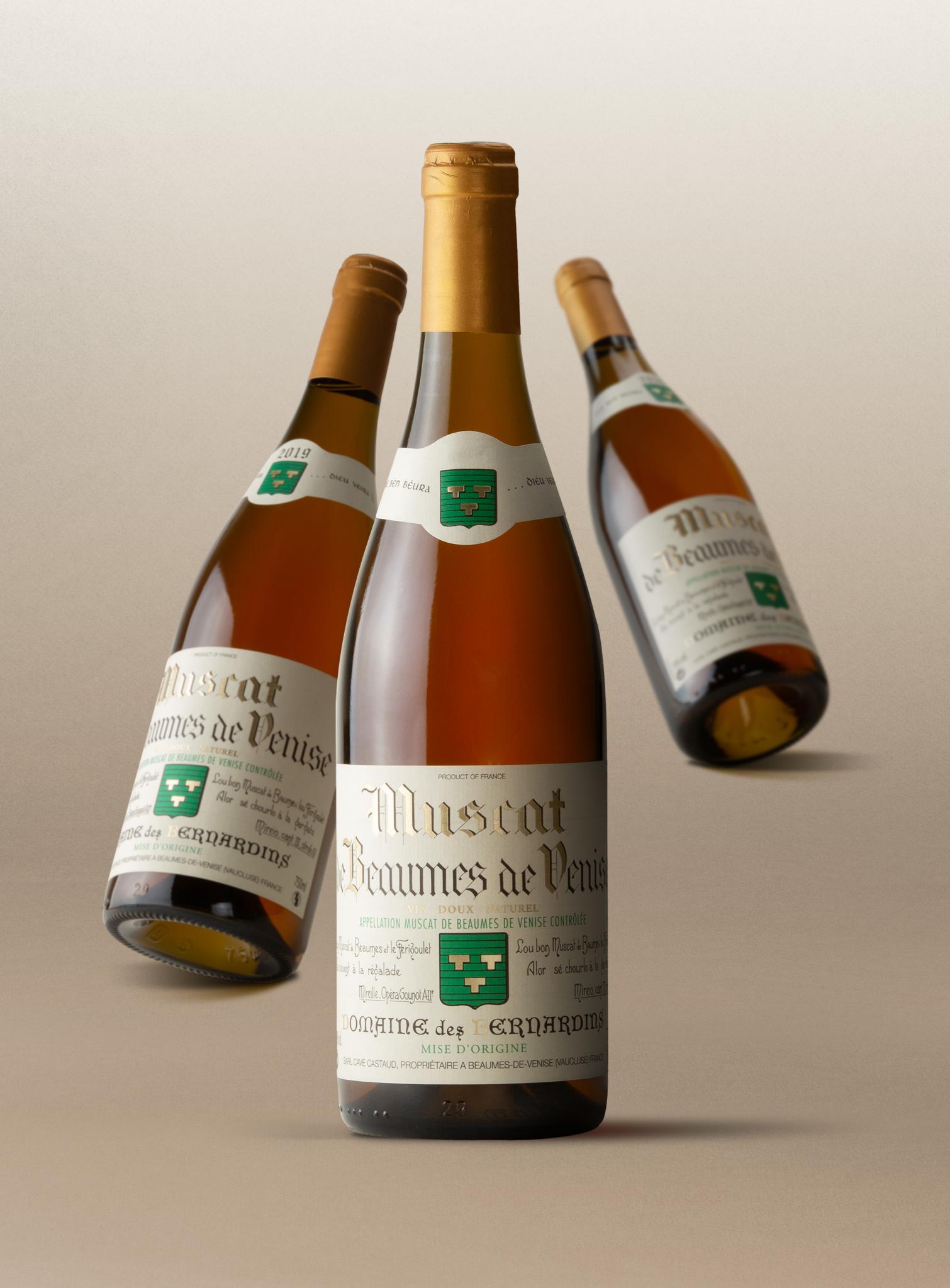
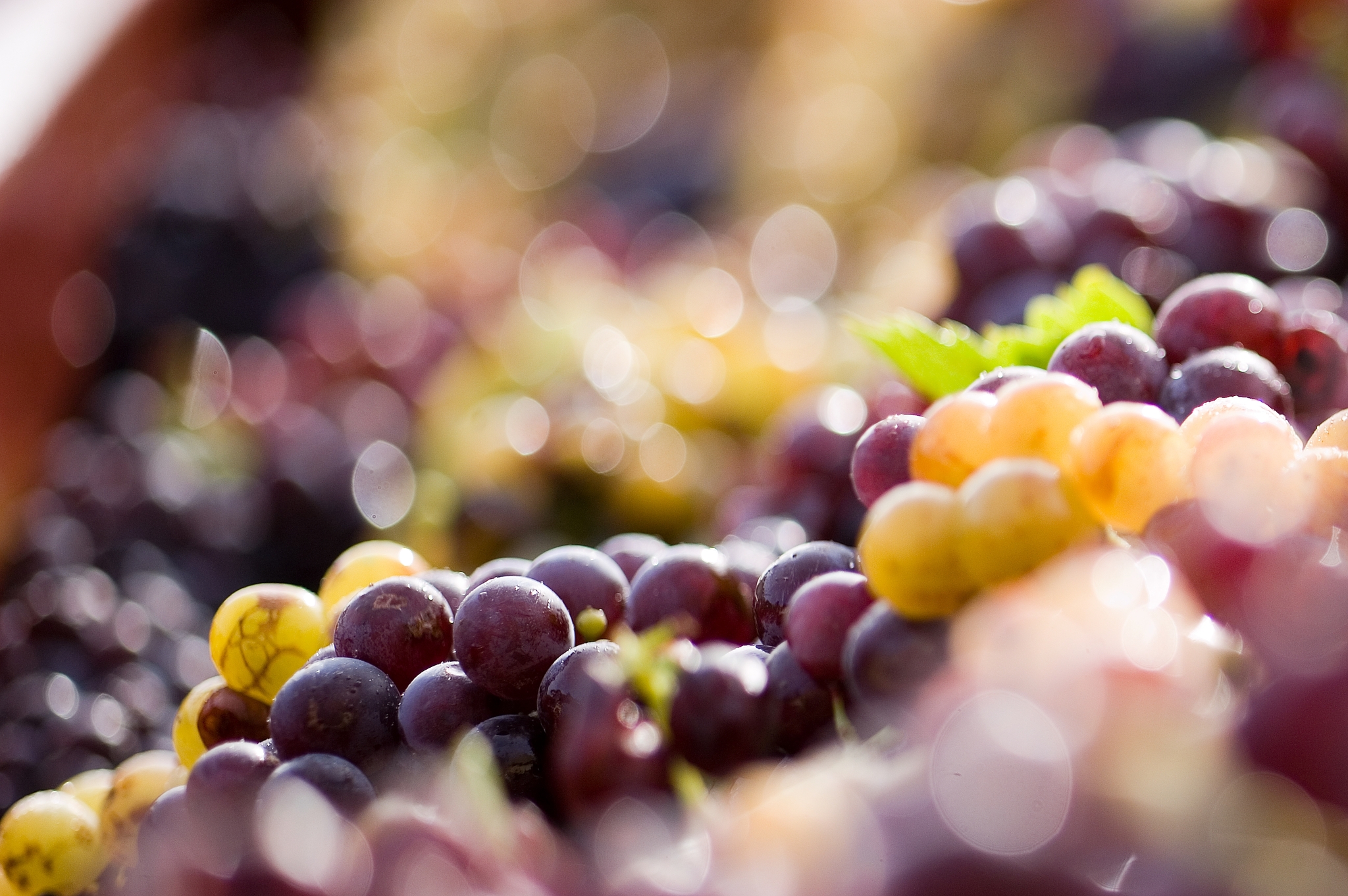
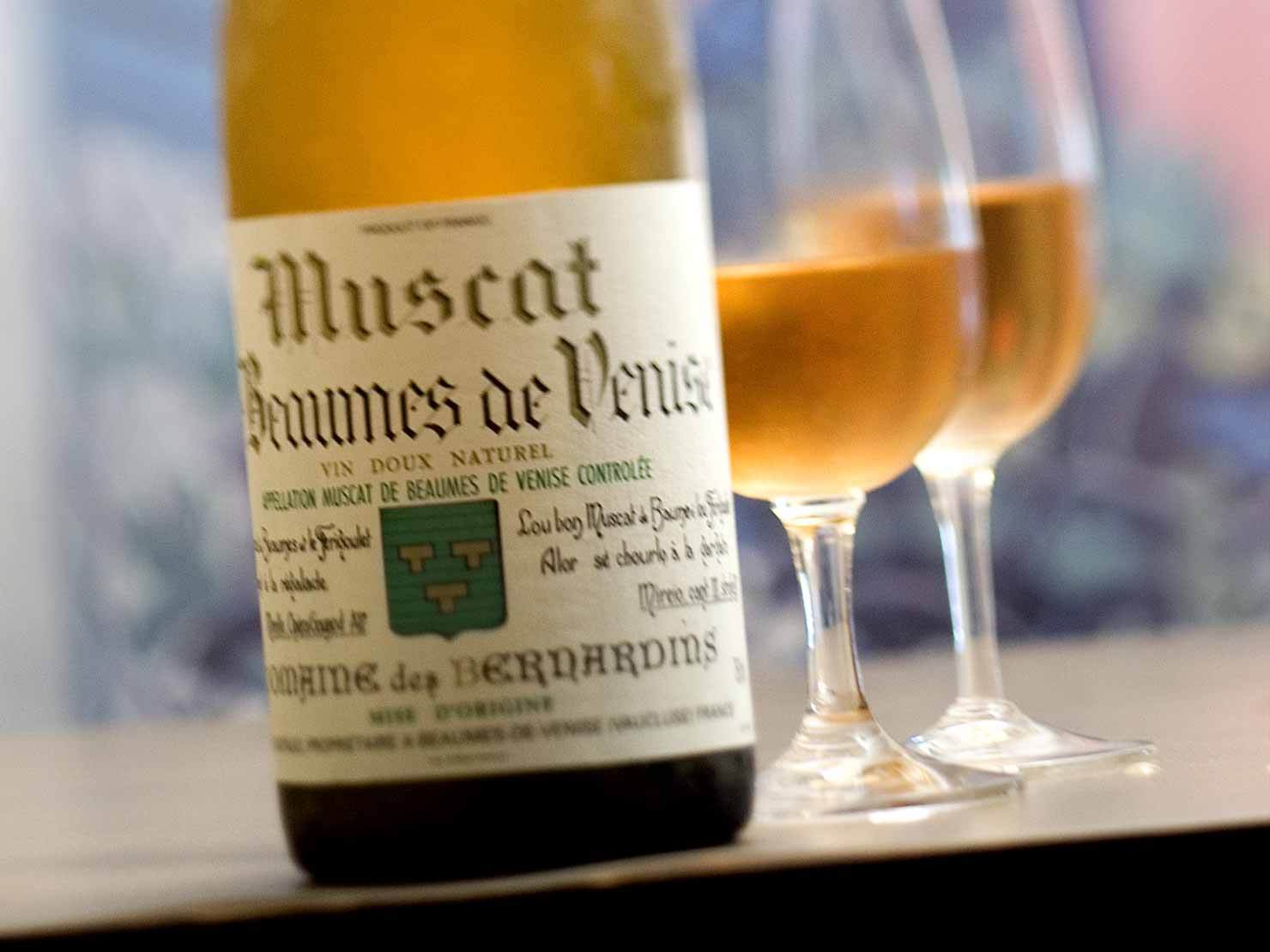
Advice
Serving
Serve at 8 ° C / Aging qualities: The Muscat becomes mellow well rounded with a copper pink robe. Its bouquet is refined with a perfect balance.
Ageing potential
Over 15 years
Tasting
Visual aspect : clear gold colour, slightly tilered.
Nose : fruity and delectable. Opening up on notes of apricot and very ripe pear. Floral notes.
Palate: fat an broad, highly enjoyable. We find aromas of the nose. Magnificent finish.
Nose : fruity and delectable. Opening up on notes of apricot and very ripe pear. Floral notes.
Palate: fat an broad, highly enjoyable. We find aromas of the nose. Magnificent finish.
Food pairings
Chilled as an aperitif, the Muscat is a versatile companion to many
dishes. Most expressive with foie gras and roquefort, it retains all its character served with a fruit tart, puff paestry and chocolate deserts.
dishes. Most expressive with foie gras and roquefort, it retains all its character served with a fruit tart, puff paestry and chocolate deserts.
Recipes
Moelleux au Muscat de Beaumes de Venise
Reviews
"Tour de France des Vins à moins de 20€ - été 2024
Robe Presque rosée : les 25% de muscat noir teintent ce vin tout en volume. L'eau-de-vie est parfaitement intégrée dans un fruit onctueux. Pour amateur de vin hédoniste.
"
Robe Presque rosée : les 25% de muscat noir teintent ce vin tout en volume. L'eau-de-vie est parfaitement intégrée dans un fruit onctueux. Pour amateur de vin hédoniste.
"
"Le bouquet se révèle enchanteur avec ses arômes de fruits tropicaux secs (ananas, mangue) et la figue sèche. La crémosité de la matière s'appuie sur des notes de miel de dattes, de citron confit. La texture ample n'est jamais trop généreuse et la finale adopte une belle fraîcheur."
"Le vin doux naturel 2023, bien mûr, abircot, écorces d'agrumes, est souligné aujourd'hui par une pointe de menthol. Il faut le garder quelques années."
"Butterscotch and apricot jam aromas. A lighter vintage of this cuvée, but very fresh and drinkable, and the best Muscat of the vintage by far. 110g/L residual sugar. In conversion to organic."
"Robe cuivrée, pâte de coing, pain d'épices, bouche grasse, marmelade, douceur équilibrée, un bon vin de repas. "
